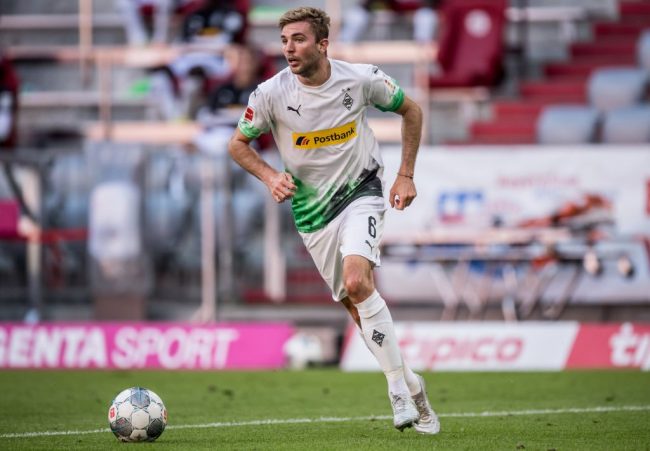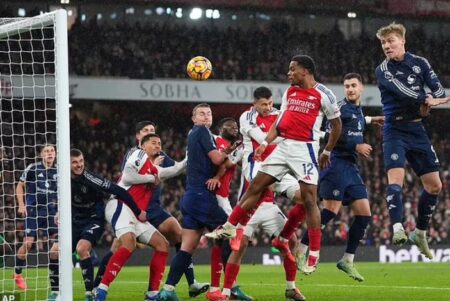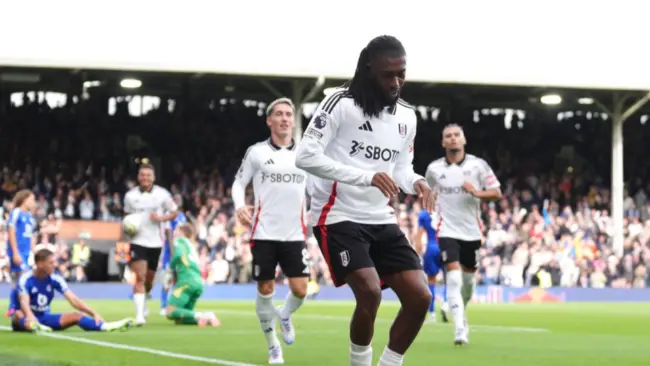Germany international and Borussia Monchengladbach midfielder, Christoph Kramer, is not only a great leader, but also poses a constant threat in front of goal. In this interview with Bundesliga International, and made available to Completesports.com, the 29 year old reveals a lot about his career and his club’s ambition to set up your expectation for enthralling moments in the 2020/2021 Bundesliga season.
How would you sum up this rather unusual pre-season?
“Pre-season wasn’t so bad. Of course, the circumstances are unusual, such as walking around with a facemask, sticking to the rules and being tested every four or five days. But you get used to that. That was sort of in the background, because on the pitch and in training, coronavirus wasn’t really an issue because we know we’ve all been tested and come out negative, so we’re in a sort of safe zone. So, we could train normally, approach things normally. We had friendlies as normal, a training camp, so it wasn’t all that inconvenient.”
To what extent is it a success that the team from last season has been kept together?
“Real praise for the club. Previously, when we’ve had a good season,
we’ve attracted the attention of other clubs and people have thought they could now take the next step. Now, the next step is taking the step here.
So, real praise for the club for that, both from an economic point of view, in that players don’t need to be sold, but also from the point of view of the club as a whole, in that they can now offer players something here that they couldn’t previously, which led to them leaving.”
Watch Video: Kramer’s Top 5 Bundesliga Goals
Gladbach have now finished in the top half of the Bundesliga in nine straight seasons for the first time since the 70s. What do you make of the progress?
“When you look at where we’ve come from… I mean, it was a long time ago but you need to look at the last nine or 10 years, at the means at our disposal. I don’t know what holds greater value: Bayern winning the league eight years in a row, which is a unique run and incredible, but it’s also incredible for Gladbach over those 10 years, especially with the means we had at the start, to create a club that is now unimaginable outside of the top six. That is simply an outstanding effort by the club.”
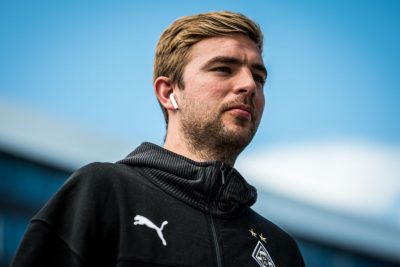
How have Gladbach managed to constantly improve despite the number of departures over recent years?
“We’ve had a clear plan, a clear philosophy, and haven’t deviated from that. In modern football, people quickly deviate from their original plan or philosophy when something doesn’t work. We had a couple of years when we finished ninth, but we didn’t let that turn us off our philosophy. Of course, small nuances always change, but we calmly stuck to our philosophy. And when it’s a good philosophy and a good plan, and you’re convinced by it, you can’t deviate from it. We’ve done that here and you can see it’s worked out really well. I think calmness is the key to success, especially when we’ve had a taste of Europe and the Champions League but not gone mad – of course we face that challenge again now, but we continue to stick to the plan we’d imagined, with continuous growth and calmness, as in recent years.”
Also Read: Bundesliga 2020/21 Kicks Off With Bang! Matchday-1 Offers More Crackers
To what extent does coach Marco Rose fit the club and the team?
“It goes without saying he’s taken the club to another level, making slight changes that have helped us in our game. So, he’s a good fit for
Gladbach.”
Can you give an example of something Rose has passed onto the team?
“In the past, we always had real issues when we weren’t in the lead and had to press the opposition high up. When we led, we had good positional play and possession, were an excellent counter-attacking team and could defend very well when deep. But now we can press high and defend high on top of that. Of course, we can still improve on that, as in all areas. But I think those are key aspects we’ve got from him, to be able to win games in different ways, including relying on second balls, playing with force, instead of just the classic possession play we’ve used for many years. There’s now more parts to it that have made our play more flexible and better.”
Denis Zakaria and Florian Neuhaus are two talented young players in your position. Do you see them more as competition or do you promote each other?
“First of all, the most important thing is that they are my teammates before being my competitors. I opted to play a team sport, so you have to live with that. You can’t enjoy the benefits of a team sport but then only think about your competitors. Of course, competition benefits us all and is important in a team, but they are my teammates before being my competitors. You have to be there for them and be there to help them
when needed. We all do that here, and I enjoy being in this team with
these players.”
What impresses you most about Zakaria?
“He has an incredible physique. It was incredible to watch him chase down Leipzig’s Timo Werner over 60 metres. Having such charisma in a stadium is unique. He has a presence and a God-given physique. He’s incredible.”
And what are Neuhaus’ strengths?
“He definitely helps our game. He’s assured on the ball and understands the game, knows where the ball needs to go, where it belongs on the pitch. I think he’s very important in our build-up play because he can always resolve a one-on-one in deep positions, which isn’t a typical one-on-one on the wing where you just dribble and trick the opponent with a stepover. It’s where you need to use your body, maybe play a one-two.
Maybe just running past an opponent without it looking spectacular, but it’s at the perfect moment. Sometimes slowing things down, using his assurance on the ball. So, I think he’s hugely important in our build-up play.”
How important is it to have strength in depth, especially considering the tight schedule this season?
“Just as important as last season, but perhaps more of an issue with the tight schedule because we won’t have a winter break. We’ll be playing three months straight through to January. There are things you can’t predict, so it’s important to have a deep squad, which we have. We can compensate for everything. Even if you look at the squad on paper and think you can only hope of getting into a matchday squad a few times
because there’s 30 of us, those players need to be aware that so much can happen. It’s a cliché, but everyone is needed, and that’ll be the case again this season, even just through the three months of continuous action. It’ll be the first time for many of us without a winter break. Those are things we need to be aware of as a squad.”
What are the goals for the season?
“If it’s about what we want, then of course we want to remain where we are. But the season needs to be played first. From my perspective, we’d gladly remain there, but you know from previous interviews that I’m not the sort of person to state aims, because I don’t think it makes much sense. We can set a goal of always wanting to play our way, regardless of the game, not going mad if we lose two games or win two games, but always playing our way. We’ve done that well in the past and always prepared well for the opposition, always reacted well to circumstances, new opponents and new situations. That’s exactly how we need to continue. It’s not about wanting but taking it one game at a time, looking at how best to win a game and increase the probability of winning a game with a good plan. If we talk about goals… Werder Bremen in hindsight with a silly goal last year, now they’re saying nothing because it could be another silly goal. Dortmund finish second because they didn’t say it, they
finish second because they said it. It’s irrelevant what you say
beforehand. The important thing is what happens on the pitch.”
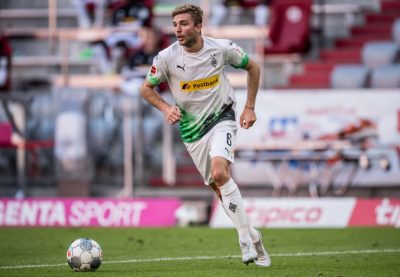
What do you believe are the reasons behind Bayern’s UEFA Champions League success?
“Honestly, Bayern Munich won the Champions League and steamrolled over everyone because they’re the only top team where they take no liberties and do it all together. Look at Paris [Saint-Germain] and take two out; Look at Barcelona and take three and a half out; Take two out of Juventus. You don’t have many teams at that level who have a world-class XI where no one takes liberties – and at Bayern they take no liberties, which is why they steamrolled everyone. [Lionel] Messi aside, teams nowadays don’t tolerate players who aren’t all there and takes liberties – it doesn’t work because the others are so good. Performances at the top are so tight that you can’t win games when one or even two are taking
liberties, regardless of how good they are – Messi perhaps being the
exception. Bayern are simply the only team where you can say that all 11 are on it, no one is taking liberties, and that’s why they swept everyone aside.”
You won the FIFA World Cup alongside Thomas Muller. How much does he impress you?
“He has to play all the time. You hear criticism of him, and I can
understand as a fan when people say he doesn’t look that elegant, but when you simply look at the facts… You can say it’s luck how he scores hisgoals, but luck is always ability – and with him it’s all ability. He’s just really, really good. There’s no second opinion about it. It doesn’t matter when, it doesn’t matter how, he just has to play because you can see his quality. His feeling for football is a talent few people have. He’s been at it for 10 years. When you look at his goals and assists alone, you have to say he’s modern. Regardless of the era in which he’s played, he’s always been modern because he was always good.”
Do you think the short summer break will have an impact on
Bayern?
“Even with Bayern, we’ll have to see. You can’t say now, but of course
after winning the Champions League what feels like just two weeks ago, it’s tough to imagine them allowing any mistakes to creep in. But still, matches have to be played. I think it’ll be tough to beat Bayern over the course of the season, but it’s always possible in a match. But it’ll be tough after such a triumph and the manner of the triumph.”
How much are you looking forward to facing Borussia Dortmund on the opening matchday?
“It’d be nicer at home and with fans, but it’s also nice away from home
without fans. I’d enjoy watching it on TV but also like to play in it. I like these local matches, and there’s no better start to a season – except
being at home.”
How have you been able to keep in touch with the fans during the coronavirus pandemic?
“It’s been tough. Back when coronavirus wasn’t really as big and we didn’t know if it was going to be bad, around the first game behind closed doors against Köln, I’ve no idea how many people were outside the stadium cheering us. I thought that was amazing. I think it was still allowed at the time, but now the stadiums are closed off and everyone, including politicians, are cautious and watching. So, unfortunately, things can’t happen. We’ve got basically no contact. It’s a real shame and doesn’t
make things any easier. I think it’s a huge loss, not just during matches
but before and after them. That’s why we do this. You can’t go over to the stands and celebrate after giving your all for 90 minutes – that’s a huge loss. But that’s how it is and I’m glad we can continue in football. No matter who you ask, fans are missed in stadiums.
What first impression has new signing Valentino Lazaro made?
“A good player. He has a quality you don’t find much today – not in the
high-end sector but in the normal sector. He’s a good player in one-on�ones on the wings, can resolve them well. Coming out on top in over 40 or 50 per cent of those isn’t something you find much these days. From what we’ve seen in the past and the first impressions, I think he’s someone who can always open things up through one-on-ones. It’s a shame he’s injured
but so far he’s confirmed the impression we had from him in the games against Hertha.”
You came through at Bayer Leverkusen at a time when they had a number of Brazilian players. What do you remember from that stage of your career?
“I was once the mascot with Lucio when he still wore the number 19,
before switching to 3. He was my favourite player, not just because I
walked out with him, but because he was an attraction with how he would dribble past people, because he didn’t have a second name, which I found great. He was just Lucio, would take the ball, dribble past everyone and scored a goal every now and then. He was just great, especially for a kid who was a central defender – I used to play a bit further back. It was the
coolest thing. And the Brazilians in general at Leverkusen, whether Ze
Roberto, Roque Junior, Franca – there were so many Brazilians and they could just play that bit better. It was more fun to watch them, maybe more so then than today, but they had a fine way of handling the ball. The Brazil national team also trained in Leverkusen ahead of the 2006 World Cup and I had the chance to watch them, which was great. After Germany, I was a big Brazil fan and had a number of Brazil shirts.”
You have played alongside Raffael for a number of years. What is it that makes Brazilians so special in football? And have you been able to learn anything from him?
“It’s tough to watch and learn. I would’ve liked to learn something. I
sometimes tried the odd stepover like Ze Roberto because I thought they were legendary, but in the time it took him to do seven I managed just two and they didn’t look as good. After a while you just have to let it go and give up on stepovers. So, it was always difficult to watch and learn, but the way they control the ball is sensational. Raffael was the best player I’ve played with here. You can’t nail down what was so good about him, but they never made technical mistakes or had 100 touches more.
That always impressed me. You knew no matter how you play the ball to them, you’ll always get it back tidily. I like players like that. I like watching them, and Raffael and Ze Roberto were just stunning.
Got what it Takes?
Predict and Win Millions Now






